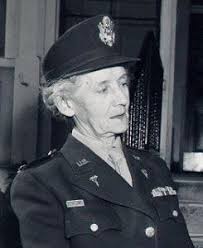Monuments
Angels of Bataan and Corregidor – Army & Navy Nurse Memorial
Mt. Samat U.S. Army and Navy Nurse Corps Plaque
Santo Tomas Internment (POW) Camp Marker

Maude Davisoin was born on March 27, 1885 in Canada. She was the senior Nurse in the Philippines at the beginning of World War 2 and lead her nurses through battle and as POWs.
From the Association of Nursing History:Maude Campbell Davison has been given credit for the survival of the 66 U.S. Army nurses who spent thirty four months as prisoners-of-war in the Philippines during World War II.
Born in Cannington, Ontario, she was educated and worked as a dietitian in Canada before emigrating to the United States where she worked as a Dietitian and Domestic Science Instructor at Epworth Hospital in South Bend Indiana. She then moved to California and graduated from the Pasadena Hospital Training School for Nurses in 1917 at the age of 32.
1917 was near the end of World War I when influenza was pandemic. Davison enlisted as a Reserve Nurse in the Army Nurse Corps and was assigned to Camp Fremont Base Hospital in Palo Alto and later to Letterman General Hospital in San Francisco. While serving in Fort Leavenworth, Kansas, she became an American citizen and a Regular Army member of the Nurse Corps. With her background in dietetics she worked with famine victims from Russia and eastern Europe while stationed in Coblenz, Germany. After completing a degree in Home Economics from Columbia University in 1928 she served as a nurse and dietitian in stateside Army hospitals.
Davison was assigned as Chief Nurse to the Philippines in 1939. A Captain by 1941, she was promoted to Chief Nurse of the Philippine Army Nurse Corps Department. She was a strict disciplinarian who kept her distance from her staff and demanded that her nurses follow protocol. With no tolerance for nonsense, she used her strong will and determination to keep the expanding department under control.
On December 8, 1941 when the Japanese attacked the islands, Davison hired civilian nurses to help care for the huge numbers of casualties pouring into military facilities. Injured during a bombing raid, she joined the American Army troops going to Corregidor or the jungles of Bataan. From the underground tunnel complex on Corregidor, she coordinated nursing activities during the fierce jungle and tunnel fighting from January until May 1942 when surrender became inevitable. With no precedent to follow, Davison ordered her remaining staff to stick together and wear their uniforms and Red Cross arm bands at all times. For 34 months she was the chief nurse of the Santo Tomas prison hospital. Many of her POW-army nurse staff credit Davison's determination to keep them working, and living together as a reason none of the 66 women died in a prison camp that held 3,785 inmates of whom 390 men, women, and children died from starvation and illness.
By Liberation Day, February 3, 1945, she was 60 and her health was compromised by the starvation diet of the POW camp. Receiving a medical discharge in 1946, Maude Davison married a long time friend and widower Charles Jackson in 1947 and lived quietly for ten years until her death in 1956. The oldest of the nurses held POW, she was also the first to die. And sadly until now her former comrades never knew where she was buried.
Following the publication of We Band of Angels, a search was begun for the gravesite of Maude Campbell Davison Jackson. Thanks to the efforts of Dr. Natalie Riegler, the grave has been located in Maude Davison's birthplace, Cannington, Ontario.
Thanks to the efforts of many people, including Brigadier General [Ret.] Connie Slewitzke, Senator Daniel Inouye, Beth Norman and the surviving " Angels, " in 2001 Maude Davison has posthumously been awarded the Distinguished Service medal.
